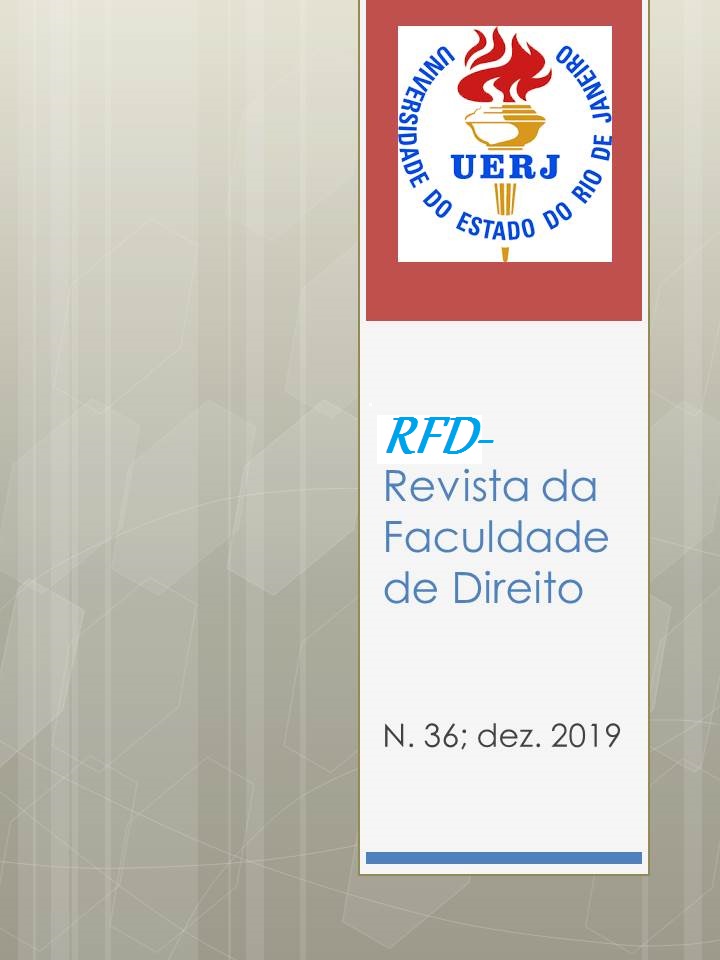Subcidadania, identidade e constituição dirigente no Brasil: os direitos fundamentais da cultura popular
DOI:
https://doi.org/10.12957/rfd.2019.40073Keywords:
Subcidadania, Constitucionalismo Dirigente, Arte, Testemunho.Abstract
Esse artigo traz uma abordagem histórica da formação do fenômeno chamado de subcidadania e suas consequências que recaíram, principalmente, sobre a população negra ex-escrava, com enfoque na negação de direitos fundamentais ao longo desse processo. Dessa forma, ressalta-se a importância em, ainda, se falar num projeto de constitucionalismo dirigente, visto que no Brasil, país em que a modernidade foi fruto de uma "importação", é necessária a transformação da realidade social para que haja uma melhoria efetiva na vida dos (sub)cidadãos. Com algumas contribuições da psicanálise, será tratada a figura do testemunho, muitas vezes utilizada como ferramenta importante para recuperação de um trauma, sendo esse trauma, no presente trabalho, a exclusão social da população negra ao longo da conformação do Estado brasileiro ao longo dos séculos. Nesse contexto, a arte, em forma de música, aparece como ferramenta de transformação do status quo, sendo o gênero musical do rap uma forma de testemunho da população negra excluída, demonstrando que por meio da arte é possível dar voz para aqueles que por muito tempo tiveram suas vozes caladas e silenciadas devido a condição de desigualdade em que esses (sub)cidadãos estavam submetidos, ficando evidente a realidade dura e difícil do (sub)cidadão.Downloads
Published
How to Cite
Issue
Section
License
Copyright
oArticles published in the Revista da Faculdade de Direito da UERJ (RFD/UERJ)
The copyrights of the published articles belong to the Revista da Faculdade de Direito da UERJ (RFD/UERJ). Total or partial reproduction of the articles is allowed as long as the source is cited.
oPartial reproduction from other publications
Submitted papers that contain parts of text extracted from other publications must obey the specified limits to ensure originality of the submitted work. Plagiarism in all its forms constitutes unethical behavior and is unacceptable.
It is recommended to avoid reproduction of tables and illustrations from other publications. The article that contains reproduction of one or more tables and/or illustrations from other publications will only be sent for analysis if it is accompanied by written permission from the copyright holder of the original work for the specified reproduction in the Revista da Faculdade de Direito da UERJ (RFD/UERJ). The permission must be addressed to the author of the submitted work. Under no circumstances will the Journal of the Law School of the State University of Rio de Janeiro (RFD/UERJ) and the authors of the papers published in this journal transfer the rights thus obtained.
•The refused studies will be returned to the authors, if asked.

The Revista da Faculdade de Direito is licensed under a Creative Commons Atribuição 4.0 Internacional License.
This work is licensed under a Creative Commons 4.0 Attribution-No Derivation License.
This license allows copying and redistribution of the material in any medium or format for any purpose, even commercial, provided that the original authorship is acknowledged.










